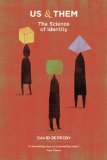Summary | Excerpt | Reviews | Beyond the Book | Readalikes | Genres & Themes | Author Bio

Critics' Opinion:
Readers' Opinion:
First Published:
Oct 2005, 384 pages
Paperback:
Oct 2008, 396 pages
 Book Reviewed by:
Book Reviewed by:
BookBrowse Review Team
Buy This Book
CHAPTER ONE
"THAT'S OUR BIGGEST DIFFERENCE"
All good people agree, And all good people say, All nice
people, like Us, are We And every one else is They.
- Rudyard Kipling, "A Friend of the Family".
Scientists, when they turn their attention to people, usually talk
about the entire human race or about the individual human being. Those
are two faces of the same idea. Truth about all is truth about each; a
theory about the mind or morality applies to everyone who ever lived, as
well as to you in particular. Either perspective yields big
explanations, which make many predictions to test and suggest many
experiments. It's where researchers like to be - working on
"the" genome, or "the" brain, or "the"
self.
They aren't nearly as comfortable with the categories in between one
person and all people - the ones that researchers, like everyone else,
use when they're off duty, away from their work. Categories like
Americans and Iranians, Muslims and Christians, blacks and whites, men
and women, southerners and northerners, doctors and lawyers, gays and
straights, soccer moms and NASCAR dads, outgoing people and shy types,
smart ones and lucky ones. Those - and all other labels that define more
than one person but fewer than all - are what I (following the
philosopher Ian Hacking and the psychological anthropologist Lawrence A.
Hirschfeld) call "human kinds."
Human kinds, whose memberships fall between All and One, map a much
more variegated world than that one-size-fits-all label Homo sapiens.
Some human kinds are types, like cranky old men and plumbers. Others are
cultures, like Basques and Thais. Some are old and populous, like the
category Japanese or Jain; others are small scale and recent, like
"former graduate students of Steven Pinker."
Some human kinds even include nonhumans. Your family, for example,
might include a dog or a cat for which you feel more and do more than
you do for faraway people. And human kinds may also enfold nonliving
things - like flags, sacred books, and graves - that are revered and
protected as if they too had lives to live and lose.
Human kinds are infinitely divisible: examine one, and you find
inside it subcategories and, inside those, still more. For example,
military veterans are a distinct kind of person from those who did not
serve; Navy vets are distinct from other services; those who served in
the brown-shoe navy (its aviation-related services) are distinct from
the black-shoe navy (other ships), and among the black-shoe vets
submariners are their own tribe, and so on and on. Some human kinds, we
are told from a very early age, we were born into - families, races,
ethnic groups, religions, and nations. Other kinds are based on bodies:
male and female, athletic or disabled. There are other kinds that other
people put us into, like nerd or jock, Bible-thumper or Godless secular
humanist. There are the kinds we join by passing special tests, like
doctor or accountant. And the ones we join to make a living, like pizza
guy or copyeditor. There are happenstance human kinds, like "women
in the ladies' room on the 8:15 ferry." There are others we sign
ourselves into by conviction, like the National Rifle Association or the
Democratic Party, and some we join because we think we must to survive -
like gangs, militias, and secret societies.
Some human kinds make sense only because members see and depend on
each other every day, like the soldiers in a combat unit. Others consist
of people who never meet, like the millions of fellow citizens those
soldiers defend. In other words, human kinds serve so many different
needs, there is no single recipe for making one. Parentage makes a
person a Brahmin, training makes her a soldier, sending in dues makes
her a member of a religious congregation. She can convert to Islam, but
not to Chineseness; she can marry into Protestantism, not into
liberalism.
Copyright © 2005 by David Berreby. No part of this book maybe reproduced without written permission from the publisher.





The House on Biscayne Bay
by Chanel Cleeton
As death stalks a gothic mansion in Miami, the lives of two women intertwine as the past and present collide.

The Flower Sisters
by Michelle Collins Anderson
From the new Fannie Flagg of the Ozarks, a richly-woven story of family, forgiveness, and reinvention.

The Funeral Cryer by Wenyan Lu
Debut novelist Wenyan Lu brings us this witty yet profound story about one woman's midlife reawakening in contemporary rural China.
Your guide toexceptional books
BookBrowse seeks out and recommends the best in contemporary fiction and nonfiction—books that not only engage and entertain but also deepen our understanding of ourselves and the world around us.